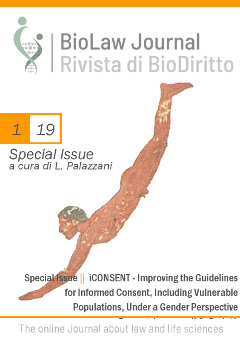Interreligious and cross-cultural perspectives on informed consent in the light of human rights and mental privacy
DOI:
https://doi.org/10.15168/2284-4503-402Parole chiave:
Autonomy, human rights, informed consent, neuroethics, religionAbstract
Even if under a lot of stress at the moment, human rights are generally considered to be absolutes that should not be touched nor put into question. Yet, recent biotechnological and neuroscientific discoveries have led many scholars to call for an increase in the level of alert that such changes in our society could imply - reaching the suggestion that we should implement new, additional human rights (cognitive liberty, mental privacy, mental integrity, psychological continuity) aimed at dealing with the specific threats that our mental privacy, autonomy and integrity could suffer from. Surely this scenario includes in direct ways our approach to informed consent and the objective of this paper is to highlight how six of the most prominent religious traditions and cultures in the world (Buddhism, Christianity, Confucianism, Hinduism, Islam and Judaism) can interact with these new human rights, underlining the specific role of informed consent within each tradition and in which way the possible implementation of this new way of conceptualizing human rights could impact -if at all- on any of the already established guidelines of each of them.##submission.downloads##
Pubblicato
2019-07-10
Come citare
1.
Garcia A, Garasic MD. Interreligious and cross-cultural perspectives on informed consent in the light of human rights and mental privacy. BioLaw [Internet]. 10 luglio 2019 [citato 5 febbraio 2026];(1S):89-100. Disponibile su: https://teseo.unitn.it/biolaw/article/view/1361





